 |
Simplicity can create a compelling, emotional environment by allowing us to focus on what is important to us. Symbols spark our thoughts and feelings into interpretations that are meaningful to our lives, and color heightens our senses and emotions. |  |
 |
The changing of the seasons surrounded by royal colors gives this stained glass window a balance of casualness and formality, an excellent combination for a boy’s school. We cut holes in the window about the size of a quarter and inserted chandelier parts so that rays of light travel around the chapel when the sun moves. |
 Working with the stained glass committee, we were given symbols that were important to the congregation. Many symbols were from children’s educational materials and literature collected over the years. Our job was to use our expertise and skill to interpret these symbols in art glass.
Working with the stained glass committee, we were given symbols that were important to the congregation. Many symbols were from children’s educational materials and literature collected over the years. Our job was to use our expertise and skill to interpret these symbols in art glass.




A wispy, iridescent white glass was chosen for the background for its ethereal quality. The symbols at the top were executed in stained glass, while some of the images were enhanced by painting. The beveled glass was used in the circles to add sparkle and light as if the symbols were an opening in our background of wispy white. We chose the scrolls because they gave a historical look to the scriptures. The lion and lily are just two of the many symbols we created explicitly for St. Peter Baptist Church.
 |
 |
 |
This window combines many of our studio’s most exemplary skills into a single piece. Each colored bevel couples hand-blown german glass with bevels hand-ground on our antique Henry Lang machinery. The sculpted branches, brilliant red leaves, and accent bevels give the tree an illusion of movement. The background glass is one of a kind and selected for its wispy blue and gold veins. Sliver bevels are adhered to the glass and reflect the light playfully.
To see more of this window, please visit our Facebook Page.
 |
 |
 |
Flameworking is a process we have explored in our studio, focusing on trying to capture the translucency of nature, that “sun coming through the tree limbs” effect. This dogwood tree is composed of sculpted solder, hand-made dogwood blossoms and leaves, and hand-blown german glass to bring it all alive.
 |
A European design for a traditional building. Using a light background hand blown glass from West Germany, with emerald green and beveled glass as accents, we gave this window a feel of “organized energy”. |

The 6th street Market window was created in one piece; a ten foot diameter stained glass window. To achieve this size, the reinforcing bars were a work of art unto themselves. We inserted beveled glass so the window would sparkle with the sun in the day and car lights at night. These windows are now owned by the Valentine Museum in Richmond, Virginia.
Charlottesville Business Journal:
November 1996 (.pdf | .jpg)
Richmond Times Dispatch:
September 16th, 1985 (.pdf | .jpg)
September 19th, 1985 (.pdf | .jpg)
Richmond News:
September 1985 (.pdf | .jpg)
 A twelve foot diameter skylight for a bank in North Carolina. With a concave bow we constructed this with a framework of T-bars and built the sections to fit like a drop ceiling. The trick is to bend the panels along the lead lines and brace with reinorcing bars to achieve and hold the curve.
A twelve foot diameter skylight for a bank in North Carolina. With a concave bow we constructed this with a framework of T-bars and built the sections to fit like a drop ceiling. The trick is to bend the panels along the lead lines and brace with reinorcing bars to achieve and hold the curve.

Every window begins with ideas. The ideas are worked through on paper, usually staring small and then enlarged to scale and reworked. This is the original full scale sketch of the Tandem window above. Usually, we are half way through a project before we cut the first piece of glass.

This window was created for the art room of a private school, grades 5 through 12. With the tree as their symbol, we wanted the window to express the energy, creativity, and spontaneity of the students. The tree was created using rolled stained glass with varying textures to give the effect of light filtering through the leaves. The surrounding area was created by hand beveling flash glass (a layer of color on a clear base) from West Germany. When completed, we made around 15 glass leaves with our flame-working and attached them to the window as if they were blowing in the wind.
Tandem newsletter:
December 2001 (.pdf | .jpg)
 |
We designed a mirror to go between the lighting fixtures using our “antique” mirror technique. With a thin line of emerald green reflective glass as an accent, we cut the mirror to the remaining design and placed the edges together so the light from the fixtures would travel along the edges as one moved around the room. This is commonly know as the “French Cut”. |
 |
Our client did not want the brash look of new mirrors, so by contaminating silver nitrate and rolling it around on a 2′ by 3′ sheet of glass, we created these “antique” mirrors. Cutting our sheets to size, we selected a place for each mirror around the room to achieve a balanced effect. |
 A beautiful church in Fluvanna, Virginia with several styles of stained glass that were greatly enhanced by removing the faded plastic and replacing with clear glass protective coverings, greatly improving the quality of light.
A beautiful church in Fluvanna, Virginia with several styles of stained glass that were greatly enhanced by removing the faded plastic and replacing with clear glass protective coverings, greatly improving the quality of light.
 |
Removing faded and yellowing plastic coverings and replacing them with clear tempered or safety glass with proper venting systems is an important part of what we do to preserve the integrity of our clients architecture. |

|
This is the original skylight window for a four-story stair case in the historic district of Baltimore, Maryland. Found in the basement, we were given this window to restore in hopes it would once again grace the top of the stairs. Caked with dirt and coal dust, sagging, lead joints broken, and also missing the center, we dismantled the four sides and went to work. We decided to make the center panel using a slight different, more opaque glass to lessen in the center and brighten the side panels. |
 |
 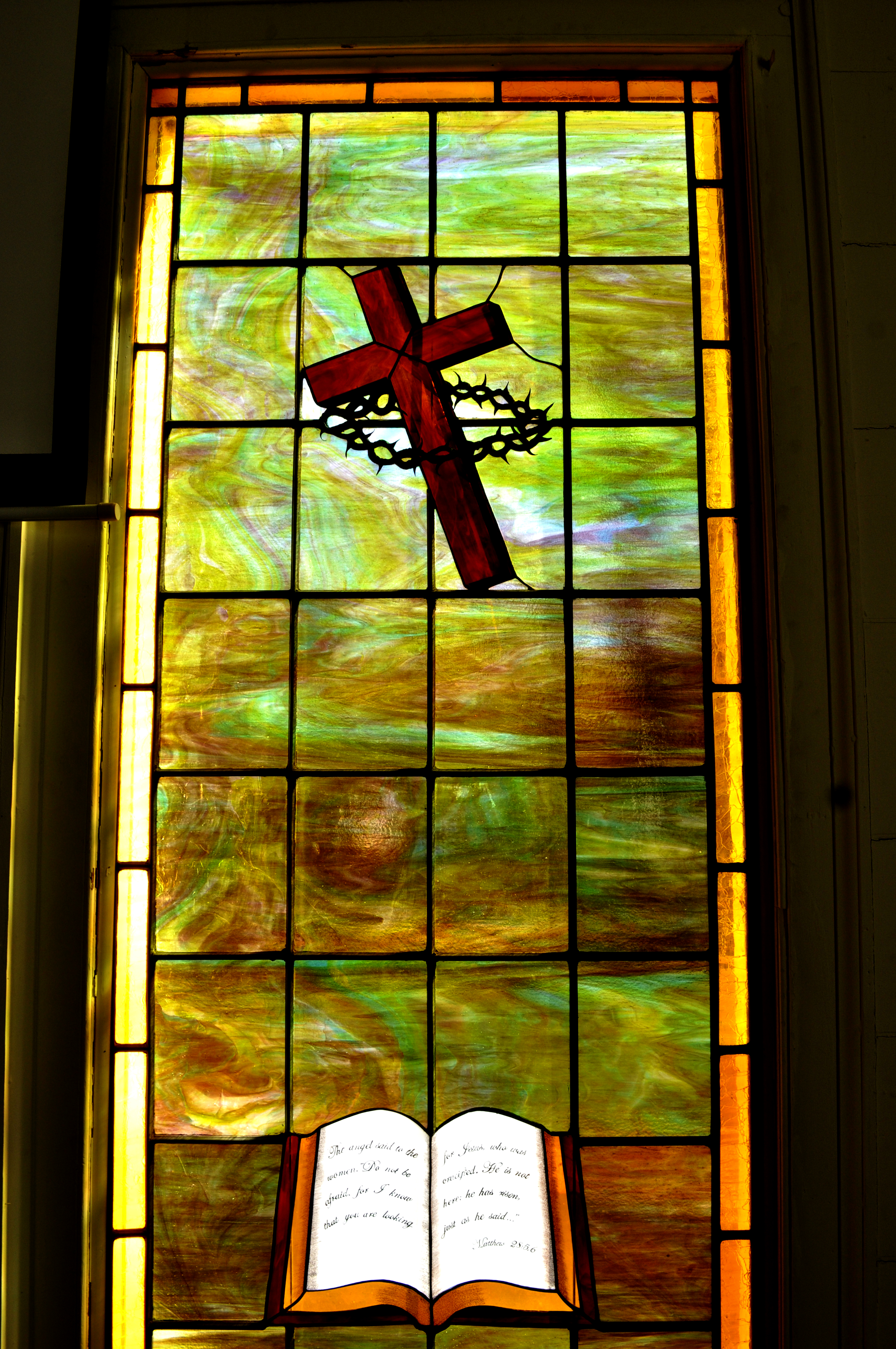  |
|
  |
|
| This is a relatively simple window in design with two significantly essential components. The crown of thorns is three-dimensional using our solder sculpting method, and the lettering on the bible is beautifully rendered as it follows the curve of the page. The green background was chosen to coordinate with the lighting fixtures and the gold to match the tassels on the American Flag. | |
 |
Along with the icon, the stained glass committee wanted thirteen contemporary stained glass windows interpreting the paintings of one of their parishioners, Mary Atkinson. Here we chose to use an adhesive to bond the stained glass to a sheet of tempered glass, removing the need for lead lines and giving us a “painted canvas” effect. |
 |
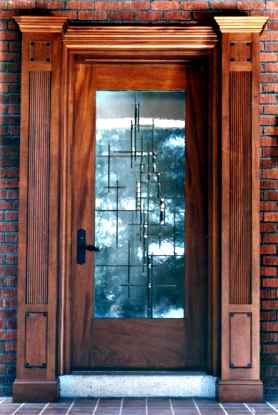 |
One of our contemporary windows where we beveled various angles on different glass thicknesses. Not symmetrical, but balanced, and with lines that reach out into the window giving an exciting and inviting feel to this traditional entryway. |
 |
 |
| A large window we created to go over a jacuzzi. With the pileated woodpecker as our focal point, we designed an overgrown and untamed tree, giving us a three-dimensional effect. This creates interest in the large area around the woodpecker, with the iridized glass picking up on the colors in the stone surrounding it. | |
 |
The iridized glass in this window blended beautifully with the surrounding colors. The delicate beveling in the tops of the trees comes alive with the lights behind them. |
 |
The couple we worked with wanted a Caribbean effect. We used antique glass with striations to give the illusion of heat waves and crystal lilies for an exotic look. |
 |
A window for over the entryway of a contemporary home. Varying lavenders picked up on the colors from the stone fireplace. The center was embellished with thin translucent glass created by our flameworking process to enhance the sun’s effect. Folding the yellow border around the window gave us an exciting alternative to a simple straight border. |
 |
Fused Glass: By cutting the glass slightly larger than the pattern, we can overlap the edges and fuse the glass in our kilns. Instead of a piece of lead holding the glass together, a seam of glass catches the light and highlights the design. As the sun moves, the light moves from one seam to another, bringing the window to life. We created eight windows like this for a beach home’s kitchen in Corolla, North Carolina. |  |

This window was created for the church choir’s practice room. Our goal was to give a windowless room a bit of the spirit to begin the early morning rehearsal.
 |
A pair of sidelights created for a couple who owns a vineyard. Here we wanted to create the effect of ice on early morning grape vines in the “dead” of winter. Hand beveling glass on our old machinery gave us the freedom to create steep, varying bevels and sculpting the vines gave them a life-like appearance. A great deal of effort went into the design to achieve the three dimensional effect with the end of the growing season branches. |
 |
 |
To create the effect of this landscape, we used various mediums from fine to corse to achieve the shading we needed to give this piece depth. The lettering was cut mechanically and the art work hand crafted. A nice combination in this commission. |
 |
Created for a couple who own an orchard, the only requirement they gave me was that it had to have an apple in it. I created an apple about the size of a 50 cent piece by flame working glass and attaching it to this window with the wintry branch. We call it “The Last Apple” |
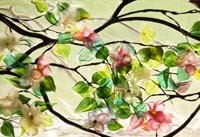 |
By cutting strips of glass from our stock, we are able to work the glass over a flame. This gives us the freedom to manipulate the hot glass into shapes and stretch it to vary and enhance its translucency. |
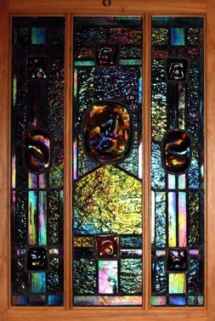 |
Iridized “turtleback jewels” were first used by Tiffany, surrounded by iridized stained glass. Plays beautifully with reflected light. |
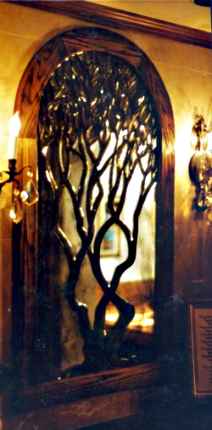 |
After hand beveling each piece of glass, we created an “antique” mirror effect by contaminating silver nitrate and silvering the back side of the glass. Then we assembled with our sculpturing technique and applied a patina for a natural look. With sconces on each side, the light reflects on the bevels as one moves down the hallway. |
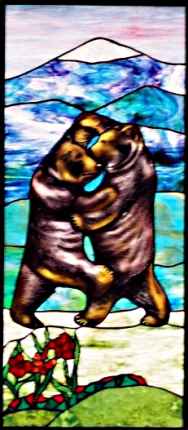 |
What a fun window. It started as a bear’s head centered in a traditional window. Evolving through our exchange of ideas, we brought this concept to life with the idea of dancing bears. Our client called one day to see how the project was going and said, “are they?” I responded, “Yes, they’re in Love.” |
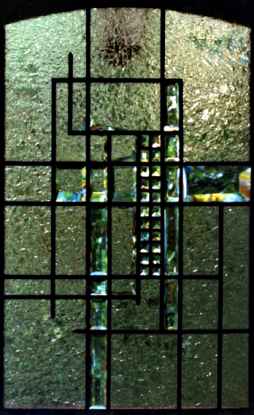 |
A beautiful example of two old glass working processes used in a contemporary way. Glue chipping and glass beveling were both developed around 1900. We can carry these traditions in our artist studio today by beveling on our 1915 Henry Lang machinery and using animal glue. |
 |
A colorful, playful stained, beveled, and sculptured window for a traditional entryway. One of a pair, these windows give an eclectic look to the foyer. |
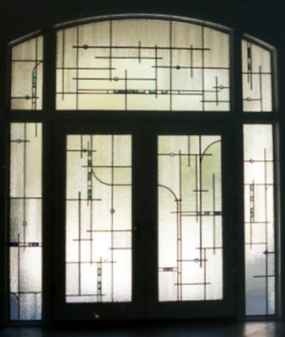 |
By adhering stained glass to the back of our bevels, we could give a jewel-like effect to the background of this textured stained glass entryway. The shadowing, created by the textures of the glass, makes this entryway especially interesting as one moves about the home. |
 |
One in a series of windows we created to simulate the vineyard’s last few days of fall. Beveling stained glass, fusing other portions, and sculpturing the solder for depth, we could bring out the piece’s true character. |
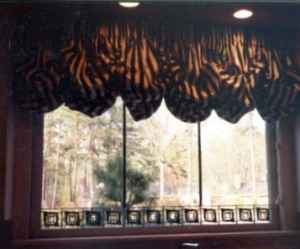 The small squares at the bottom of black beveled glass embellished the curtains above and still gave our clients their view over the kitchen sink.
The small squares at the bottom of black beveled glass embellished the curtains above and still gave our clients their view over the kitchen sink.
 One of our contemporary beveled glass windows with various beveling techniques on different thicknesses and textures of glass. The lines in the window pick up on the lines and proportions in the room.
One of our contemporary beveled glass windows with various beveling techniques on different thicknesses and textures of glass. The lines in the window pick up on the lines and proportions in the room.

A quilt-influenced design for a series of doors into a “South West” room. We used many different colors of European hand-blown glass, balanced and coordinated, to achieve the unique look our client was seeking.


This detail from one of the two rose windows we created for the new St. Thomas Aquinas Priory in Charlottesville, VA, is of the Dove, representing the Holy Spirit. The diapering on the hand-blown blue German glass, done in the classic style of painting on glass, is meant to be imperfect, to remember a time when stained glass art was imperfect. These imperfections are what makes the window have it’s unique character, why oil paintings are much better than photocopies.

These blossoms, hand-worked over a flame to achieve their translucency and character, were commissioned by Winchester Medical Center for their new Cardiac Unit. This panel, the first in a series, used mainly pink blossoms and darker leaves. The floating petals, as seen on the top right, give the panel the illusion of motion, as if the tree is succumbing to a brisk breeze. The sculpted branches and completely one-of-a-kind design, make this panel appear alive.


After this historic Baptist church in Petersburg was vandalized, we were tasked to replicate the century-old window for this historic church. When a window is severely damaged, it is sometimes best to create an all-new duplicate. We matched the glass, made a charcoal rubbing of the original, and then started the recreation. After much hard work, the finished piece brings the entryway back to life.

